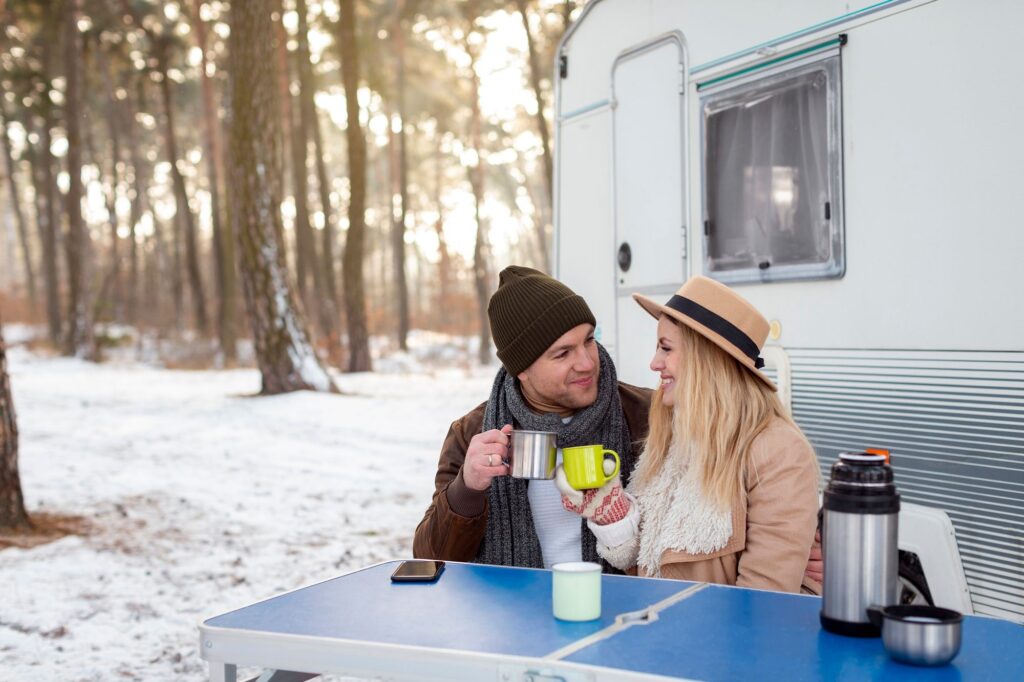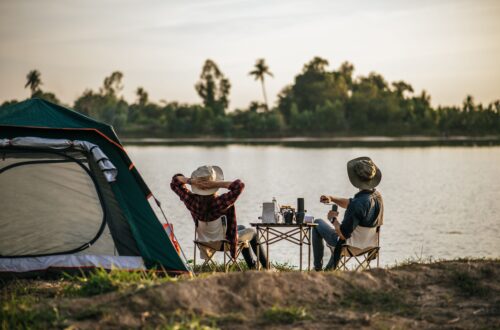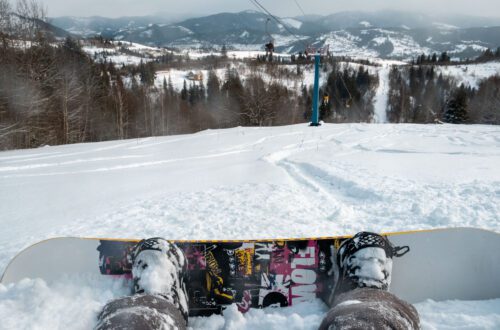How to Winterize Your Camper
Hey there fellow campers! As the temperature drops and the snow begins to fall, it’s time to prepare your beloved camper for the winter months ahead. Whether you’re a seasoned camper or just getting started, winterizing your camper is a crucial step in ensuring its longevity and keeping you warm and cozy during your cold-weather adventures. So, grab a cup of hot cocoa and let’s dive into my essential tips for how to winterize your camper. From insulating windows to protecting water lines, these tips will not only help you avoid costly repairs but also make sure that your home away from home is ready to handle whatever Mother Nature throws at it. So, let’s get started and make sure that this winter is all about fun in the snow, not worrying about frozen pipes or chilly nights!

It is Essential to Winterize Your Camper
Let’s face it, nobody wants to deal with a frozen water tank or a burst pipe in the middle of winter. That’s why taking the time to properly winterize your camper is crucial for ensuring its longevity and functionality. Sure, it may seem like a tedious chore, but trust me, the headache of dealing with costly repairs later on is far worse.
The process to winterize your camper not only protects your investment but also sets you up for a worry-free camping experience when spring rolls around. By taking the necessary steps to protect your plumbing and water systems from freezing temperatures, you can avoid potential damage and enjoy peace of mind during the off-season. Plus, thinking ahead and being proactive about winterizing shows that you’re a responsible and savvy camper who takes pride in caring for your outdoor home away from home. So embrace the frosty season by giving your trusty camper some TLC – it’ll thank you later!
Inspecting and Sealing the Exterior
So, you’ve finally decided to winterize your trusty camper and want to make sure the exterior is in tip-top shape. One of the most crucial steps is inspecting and sealing all those nooks and crannies where Jack Frost can sneak in and wreak havoc. Trust me, I learned this the hard way when I woke up one chilly morning to find my cozy camper had turned into an igloo overnight!
Inspection time! Grab a flashlight, get down on your hands and knees, and give your camper a thorough once-over. Look for any cracks, gaps, or openings that could let in cold air or moisture. Even the tiniest hole can cause big trouble! Once you’ve identified the trouble spots, it’s sealing time! Arm yourself with some top-notch sealant—a quality silicone caulk should do the trick—and get ready to go to battle against Old Man Winter.
Now comes the fun part—sealing up those sneaky little spots before they have a chance to ruin your winter wonderland adventure. Apply the sealant generously but carefully, making sure to cover every crevice and seam like you’re frosting a cake (except this cake keeps out frost). It may not be glamorous work, but trust me; it’ll save you from shivering under layers of blankets when you should be sipping hot cocoa by a crackling fire. So roll up those sleeves, grab that caulk gun with gusto, and show Mr. Winter who’s boss!
Winterize Your Camper by Draining Water Systems & Tanks
First off, don’t just drain the water and call it a day. You’ve gotta make sure all the faucets, showers, and toilets are thoroughly drained to avoid any nasty surprises when you hit the road again. I mean, who wants to start their next trip with a moldy water tank? Not me! And here’s a pro tip: invest in some RV antifreeze and run it through the system to ensure everything is properly protected from those winter chills.
Now, for my fellow DIY enthusiasts out there – don’t overlook the importance of checking for leaks or cracks in your tanks before calling it quits. Trust me, it’s much better to catch these issues now than discovering them mid-road trip with no help in sight! So get down and dirty inspecting those tanks for any signs of trouble.
Protecting Propane and Electrical Systems
Winterizing my camper has always been a top priority for me, especially when it comes to protecting the propane and electrical systems. It’s more than just a checklist item—it’s about ensuring that my home on wheels is safe and ready for the cold weather ahead. When it comes to the propane system, I make sure to check for any leaks or damage, and I always keep an eye on the pressure levels to prevent any surprises during those frigid winter nights.
As for the electrical system, I’ve learned from experience that investing in quality surge protectors and making sure all connections are secure can be a game-changer. Cold temperatures can wreak havoc on wiring and connections, so taking that extra time now can save me a headache later. Plus, I never underestimate the power of keeping everything clean and dry—moisture is not our friend in these components!
I take pride in knowing that my camper is prepared for winter adventures without any hiccups in its essential systems. After all, nothing puts a damper on a snowy escapade quite like sudden propane issues or electrical malfunctions! So let’s toast (with some hot cocoa) to staying cozy and worry-free on our winter journeys!
Storing and Covering to Winterize Your Camper
Storing and covering the camper might not sound like the most riveting topic, but trust me, it’s an essential part of being a savvy camper owner. As the winter rolls in, giving your camper the royal treatment is crucial to ensure it stays in top-notch condition. Think of it as pampering your beloved adventure buddy before tucking it in for a long winter’s nap. First things first, clean every nook and cranny of your camper – cozied up dirt and grime can cause some serious damage over time. Next step: cover that bad boy up! Trust me, you don’t want Mother Nature’s whimsical mix of snow, rain, and wind wreaking havoc on your precious mobile home.
But here’s the kicker – storing and covering the camper isn’t just about protection; it’s also a chance to give your ride a little makeover. Personalizing your cover with funky designs or adding some custom touches shows off your personality even when temperatures are flirting with freezing levels. So go ahead and embrace this as an opportunity to show some love to your trusty steed – because let’s face it, campers need love too!
Preparing for Long-Term Storage
So, you’ve decided to tuck away your trusty camper for the winter? It’s not just as simple as covering it and calling it a day. As much as we’d all love to believe that our vehicles are invincible, long-term storage requires some serious prep work. Let’s start with the basics: cleaning and maintenance. Don’t skimp on washing both the interior and exterior; pesky crumbs or crumbs can attract unwanted guests (looking at you, rodents). Once cleaned, inspect every nook and cranny for signs of wear or damage.
This step might sound tedious, but trust me – a stitch in time saves nine when it comes to avoiding costly repairs down the road. Now onto fluids – don’t forget to top up liquids like fuel stabilizer before storing your camper for an extended period of time.
Next up: protecting against the elements. Trust me when I say this – nature isn’t always kind to our beloved campers! Investing in a quality cover is non-negotiable here; think of it as a cozy blanket for your vehicle during hibernation. But hold your horses! Before you snugly tuck away your camper under its cover, let’s discuss tire care – because nobody likes deflated wheels. Over-inflate them slightly to offset any potential loss of air over time or awkward flattening due to prolonged periods of immobility.
And please oh please rotate them every few months; after all, who wouldn’t want their tires to stay perfectly round? Remember folks, winterizing your camper may seem like an arduous task but think about it this way – those summer adventures will be one step closer once spring arrives!
Final Thoughts on How to Winterize Your Camper
So, as the winter camping season approaches, remember to embrace the chill and enjoy a stress-free adventure. With some careful planning and preparation, it doesn’t have to be difficult to winterize your camper. From insulating your water lines to investing in a good pair of thermal socks, there are plenty of ways to ensure you’re cozy and comfortable during cold nights.
Don’t forget that flexibility is key when it comes to winter camping. Mother Nature can be unpredictable, so being able to adapt your plans on the fly will minimize stress and maximize enjoyment. And let’s not forget the magic of waking up to a pristine snow-covered landscape outside your camper door – it’s an experience like no other. So pack your sense of adventure along with those extra layers, and get ready for a winter camping season full of unforgettable moments!







2 Comments
Pingback:
Pingback: